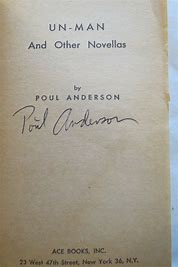"Un-Man."Despite its action-adventure plot, this story builds up a picture of people living in a future period.
(i) The narrative opens in a large apartment building, "...a city in its own right...," (I, p. 32) overlooking the Illinois plain, "...green with corn..." (ibid.)
(ii) The action moves to the "...dust and cobwebs..." (II, p. 35) of an uninhabited part of the dying city of Chicago.
(iii) A half underground town and its plantations on Mars. (III)
(iv) Sofie is an engineer on the Pacific Colony project and a member of a free-marriage group. (IV)
(v) People wear masks for privacy. (V)
(vi) Naysmith lands his flying boat on a ramp of the Frisco Unit where he takes an elevator past shops, offices, schools etc, then travels on slideways through a residential area on the 107th level.
(vii) Postwar resettlements are called "colonies." (VI)
(viii) The government regulates giant agricultural combines.
(ix) Local private fruit-raising plantations cooperate to compete against them.
(x) Many people commute by airbus from Brigham City to work in, e.g., the Pacific Colony.
(xi) Jeanne Donner works "...at home as a mail-consultant semantic linguist..." (VI, p. 60)
(xii) Hindu peasants have tiny fields whereas Chinese collectives get powerplants.
(xiii) Complex civilization requires ruthlessly selective education, generating intellectual and social stratification.
(xiv) There are slums around Manhattan Crater but floating oceanic colonies; cities on the Moon, Mars and Venus but Congo natives drumming at rain clouds.
(xv) A generation of Synthesis-trained citizens might make a difference.
(xvi) Geriatrics and birth control generate an older, less flexible population just when originality is needed.
(xvii) "...the change in technology had brought a change in human nature itself which would have deeper effects than any ephemeral transition period." (p. 64)
Amen to (xvii).

















































